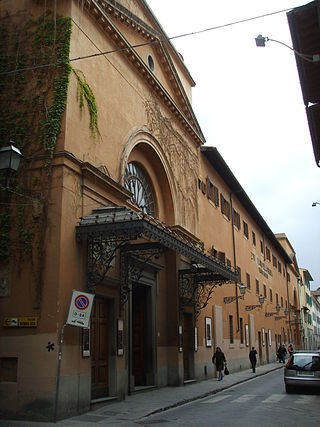Adriano Morselli was a Venetian librettist active between 1679 and 1691. His libretti have been set to music by composers like Antonio Vivaldi, Alessandro Scarlatti, Giacomo Antonio Perti, Bernardo Sabadini, Carlo Francesco Pollarolo and Domenico Gabrielli. His most popular works were L'incoronazione di Dario from 1684 and Tullo Ostilio from 1685, and the unfinished La pace fra Seleuco e Tolomeo from 1691.

Bernardo Pasquini was an Italian composer of operas, oratorios, cantatas and keyboard music. A renowned virtuoso keyboard player, he was one of the most important Italian composers for harpsichord between Girolamo Frescobaldi and Domenico Scarlatti, having also made substantial contributions to opera and oratorio.

Giacomo Antonio Perti was an Italian composer of the Baroque era. He was mainly active at Bologna, where he was Maestro di Cappella for sixty years. He was the teacher of Giuseppe Torelli and Giovanni Battista Martini.
The year 1716 in music involved some significant events.
This is a list of notable events in music that took place in the year 1686.
Bernardo Sabadini was an Italian opera composer. He may have been a native of Venice. A number of his operas appear to have been revisions of works by other composers to an unknown extent. He died at Parma.
The Diocese of Nocera dei Pagani-Sarno, commonly known as Diocese of Nocera Inferiore-Sarno, is a Latin Church diocese of the Catholic Church located in the Campania region of Italy. It is a suffragan of the Archdiocese of Salerno-Campagna-Acerno.

Carlo Francesco Pollarolo was an Italian composer, organist, and music director. Known chiefly for his operas, he wrote a total of 85 of them as well as 13 oratorios. His compositional style was initially indebted to the opera tradition of Giovanni Legrenzi and Carlo Pallavicino, but he moved beyond this style with innovations to the compositional structure of the aria characterized by expanded forms and orchestral elaborations. His early work used three part strings in the Legrenzi and Pallacino tradition of orchestration, but his mid and later works had developed into a richer orchestration of five strings parts and expanded instrumentation of brass and woodwinds. He was the first Venetian opera composer and one of the earliest Italian composers to use the oboe in his opera orchestrations.
Giuseppe Felice Tosi was an Italian composer and organist, and the father of Pier Francesco Tosi, also a successful composer.

Antonio Salvi was an Italian physician, court poet and librettist, active mainly in Florence, Italy. He was in the service of the grand-ducal court of Tuscany and the favourite librettist of Prince Ferdinando de' Medici. Salvi was one of the developers of the opera seria.

This is a chronological list of classical music composers from Italy, whose notability is established by reliable sources in other Wikipedia articles.
Silvio Stampiglia was an Italian poet, librettist, and founder member of the Accademia dell'Arcadia under the pen name of Palemone Licurio. Numerous Italian composers set his libretti to music, particularly Carlo Agostino Badia and Giovanni Bononcini.

In music history, the Neapolitan School is a group, associated with opera, of 17th and 18th-century composers who studied or worked in Naples, Italy, the best known of whom is Alessandro Scarlatti, with whom "modern opera begins". Francesco Provenzale is generally considered the school's founder. Others significant composers of this school are Giambattista Pergolesi, Domenico Cimarosa and Giovanni Paisiello.
It is with the Neapolitan school...that the History of Modern Music commences—insofar as that music speaks the language of the feelings, emotions, and passions.
The Cappella Marciana is the modern name for the choir and instrumentalists of St Mark's Basilica, Venice, Italy.
Gerolamo Frigimelica Roberti was an Italian architect, librettist, and poet.
Aurelio Aureli was an Italian librettist.